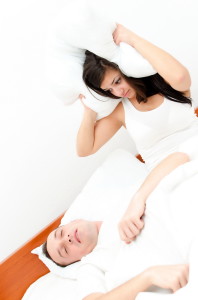 Do you have trouble sleeping because your partner is an incessant snorer? Does your partner complain that your snoring keeps him/her up all night? Snoring can be more than a mere nuisance, and when it indicates obstructive sleep apnea, it can deprive the snorer of necessary rest as well as the snorer’s sleeping partner. Your Astoria dentist, Dr. Leibowitz, has helped many patients achieve the restful sleep they need by treating their sleep apnea. Today, we help you better understand the disorder with a short snoring and sleep apnea quiz.
Do you have trouble sleeping because your partner is an incessant snorer? Does your partner complain that your snoring keeps him/her up all night? Snoring can be more than a mere nuisance, and when it indicates obstructive sleep apnea, it can deprive the snorer of necessary rest as well as the snorer’s sleeping partner. Your Astoria dentist, Dr. Leibowitz, has helped many patients achieve the restful sleep they need by treating their sleep apnea. Today, we help you better understand the disorder with a short snoring and sleep apnea quiz.
Trouble with Sleep Apnea?
1.) Though snoring often indicates obstructive sleep apnea, not everyone who snores suffers from OSA.
a.) True
b.) False
2.) What does the term “apnea” mean?
a.) To snore c.) To stay awake
b.) To stop breathing d.) To be annoying
3.) Why does snoring (and OSA) occur?
a.) Collapsing airway c.) Uncomfortable sleeping clothes
b.) Mucus d.) Nightmares
4.) Most OSA patients aren’t aware of their numerous apnic episodes. What are signs that can indicate the presence of OSA, aside from snoring?
a.) Trouble concentrating c.) Blurry vision
b.) Bad temper d.) All of the above
Find Out Why
1.) True—Obstructive sleep apnea is essentially extreme snoring, marked by brief, recurring pauses in your breathing. OSA occurs when your throat tissues completely close your airway and halt your breathing, which does not occur with every case of snoring.
2.) To stop breathing—Apnea is a Greek word that means “to stop breathing”. There are different kinds of sleep apnea, the most common of which is obstructive sleep apnea, or the closing of your airway by over-relaxed oral tissues. After a moment or two, your brain panics from the lack of oxygen and wakes your body enough to start breathing.
3.) Collapsing airway—Before your throat tissues completely close your airway and stop your breathing, air is forced through the increasingly-smaller path, causing the tissues to vibrate violently and, combined with the forced concentration of air, create the sound of snoring.
4.) All of the above—Most apnic episodes don’t rouse the patient from consciousness, but the interruption in your sleep pattern can occur hundreds of times a night. If you don’t sleep with a partner to complain about your snoring, then you might suspect the condition if you experience signs of sleep deprivation, like diminished mental keenness, irregular irritability, and daytime fatigue, among others.
Learn How You Can Stop Snoring with Help from Your Astoria Dentist
To learn how you can stop snoring, or if you suspect that you or your partner might have sleep apnea, schedule a dental consultation with your Astoria dentist by calling our office today at (718) 728-8320. Located in the 11106 area, we proudly serve patients from Astoria, Queens, Manhattan, Brooklyn, and the surrounding communities.


